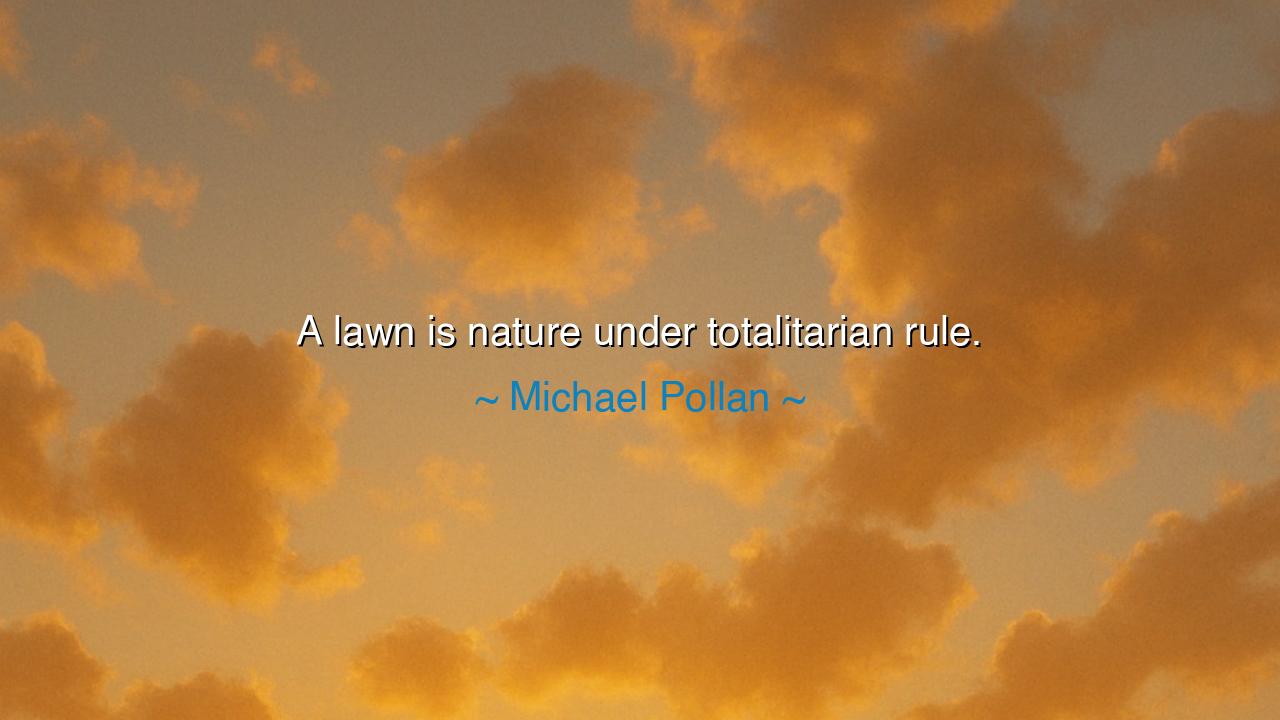
A lawn is nature under totalitarian rule.






Hear the words of Michael Pollan, philosopher of food and nature, who declared with both wit and warning: *“A lawn is *nature under totalitarian rule.” In this saying lies not only a critique of a patch of grass, but a profound meditation on mankind’s relationship with the earth. For what is the lawn, that symbol of suburban perfection, if not a green empire of control — trimmed, uniform, obedient, and silent? It is beauty by domination, order without life. In it, nature has been conquered, stripped of its wildness, and commanded to conform. And thus, Pollan speaks not merely of gardens, but of the human soul that seeks mastery over the living world instead of communion with it.
The lawn, so celebrated in modern culture, is in truth a monument to man’s fear of imperfection. Each blade must be equal; each weed must be slain. It is watered even when skies are dry, fed with chemicals, guarded from insects, and cut before it can dream of flowering. Nothing spontaneous is allowed, nothing untamed permitted to thrive. In the lawn, man has turned nature into a subject — a slave made to wear the mask of harmony. But as all tyrannies do, it hides decay beneath its order. The soil beneath grows weary; the life within it dwindles. The very beauty it promises is bought at the cost of vitality.
In ancient times, the wise sought balance with the earth. The Persians built gardens that mirrored the order of the cosmos, yet they allowed water to wander and flowers to bloom as they willed. The Chinese sages spoke of the Tao — the Way — which cannot be forced, only followed. To them, the wildness of nature was sacred, for it revealed the hand of Heaven. But the lawn is born of another spirit: the will to dominate, to erase all difference, to impose a single, monotonous perfection. It is not the child of Eden, but of empire — a green battlefield where diversity is the enemy.
Think of Versailles, that great palace of Louis XIV, the Sun King of France. Its gardens stretched in endless lines of symmetry, every tree and hedge disciplined into submission. It was said that the king could stand upon his balcony and see the world obey. The garden was not a place of rest — it was a symbol of power. It declared, “Even the earth bends to my command.” From that royal tyranny of soil, the tradition of the modern lawn was born — a domesticated wilderness that flattered the pride of man while silencing the song of creation.
Pollan’s warning, though wrapped in humor, speaks with the gravity of prophecy. For the lawn, in its endless maintenance, mirrors the soul of modern life — obsessed with control, terrified of wildness, unwilling to coexist with disorder. We mow and prune not only our grass, but our own spirits, cutting away spontaneity, curiosity, and the unplanned joys of being alive. We chase the illusion of neatness while starving the roots of vitality. Like rulers of a green dictatorship, we mistake silence for peace, sameness for beauty, obedience for order.
But there is another way — a way known to the ancients and remembered by the wise. It is the way of the garden, not the lawn. A garden is dialogue, not decree. It listens to the earth, accommodates her moods, and works in partnership with her rhythms. It welcomes the bee, the weed, the wandering breeze. In the garden, the gardener does not command — he collaborates. And in that humble labor, he finds not domination but harmony, not power but peace.
Thus, the lesson of Pollan’s words is this: release your grip on perfection. Do not seek to make nature obey; learn instead to join her in her dance. Let your patch of earth — and your life — bear signs of the wild. Allow imperfection, for it is the handwriting of the divine. Sow flowers that feed the bees, plant trees that shade the weary, and let your garden hum with life, not silence.
For remember: the lawn is green, but it does not live. The garden lives, and in its living, it teaches freedom. So do not be a ruler of nature — be her companion. And then, like the sages of old, you will discover that the truest beauty is not in control, but in coexistence — the peace that comes when the human heart once again bows, not as a tyrant, but as a friend, before the mystery of the earth.






AAdministratorAdministrator
Welcome, honored guests. Please leave a comment, we will respond soon